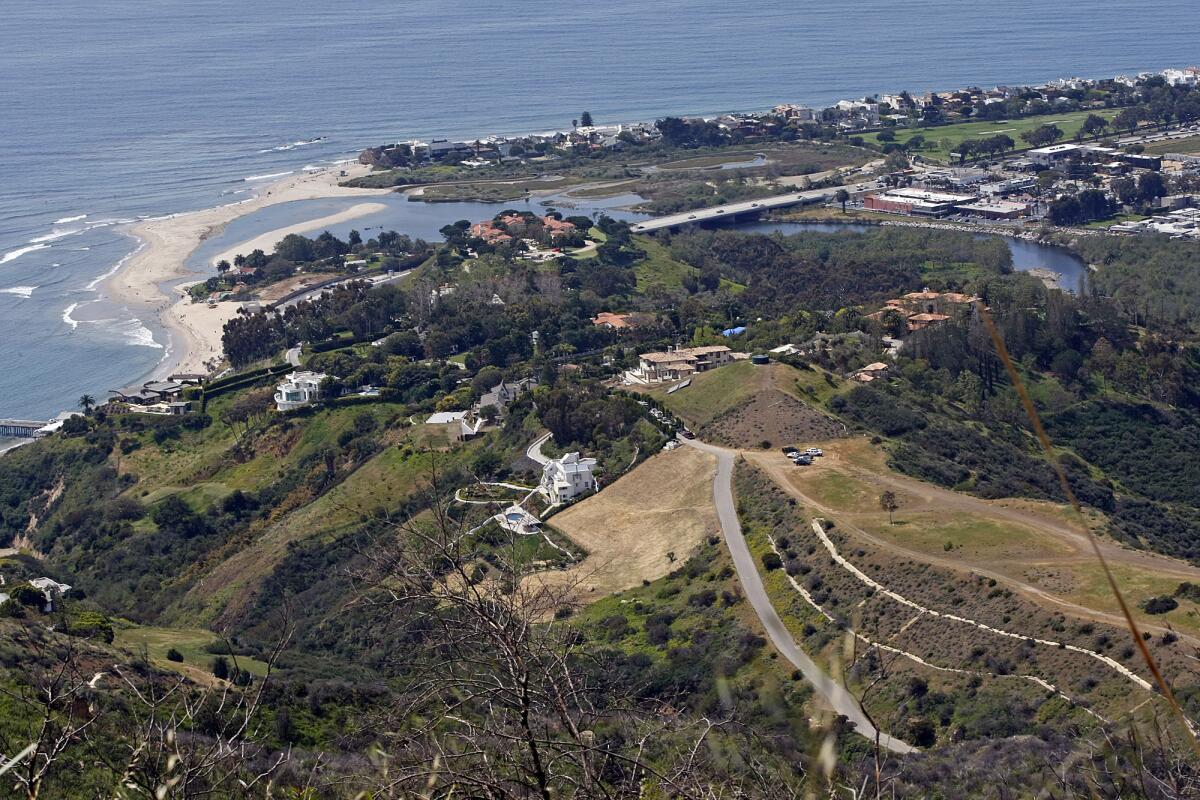U2’s the Edge gets state approval to build controversial homes on a Malibu ridge

This photo shows the road leading to the Malibu property owned by U2’s the Edge.
- Share via
For years, U2 guitarist the Edge has sought to build five homes atop an undeveloped ridge in an unincorporated area of Malibu.
For nearly a decade, environmental groups and many residents have objected, saying to do so would needlessly despoil sensitive habitat and mar the visual landscape.
On Thursday, after numerous hearings of the California Coastal Commission, the Irish musician finally prevailed.
See the most-read stories this hour >>
At a meeting in Monterey, the panel voted unanimously to approve David Evans’ project — although much has changed since the initial proposal in 2011.
Five houses will be built on the property in the Sweet Mesa area, each one more than 10,000 square feet and featuring its own swimming pool.
But where they once were to stand proudly spread out along the upper ridge line, the homes instead will be clustered closer together on a lower plateau.
According to the approved plan, efforts will be made to use exterior colors that help the structures blend in with the environment. There won’t be as much glass as originally proposed, and what there is will be designed to reduce glare.
Tucked into the hillside and no more than 18 feet above grade, the homes will still be visible from many points around Malibu, including from Pacific Coast Highway.
Evans agreed to conserve 140 acres of the property as open land and allow a hiking and equestrian easement linking to the Coastal Slope Trail.
In a written statement, the musician — who at one point threatened legal action to get his permits — thanked the commission and community members “for all their thoughtful feedback and guidance throughout this long process. It has inherently driven better home designs and ensured protection of Malibu’s natural resources.
“From Day One,” he said, “my intention was to build a home of the very highest possible standard of environmental sensitivity and sustainability. Together, this collaborative effort has achieved that goal.”
That being said, construction of the homes on just over five acres of the property will require 63,390 cubic yards of grading and disturb 17 acres of habitat classified as environmentally sensitive. (Project staff and commission staff alike on Thursday emphasized the percentages by which such numbers had been much reduced since the original application.)
NEWSLETTER: Get essential California headlines delivered daily >>
There’s also the new water line and access road, and countless trucks that will be going up and down the hill in order to get the project built.
Opponents voiced their objection not only to the project, but also to the commission voting at a meeting in far-off Monterey. They said the distance from Malibu would prevent many of those who wanted to speak out from having their voices heard.
Among those who sent letters asking the commission to delay action were L.A. County Supervisor Sheila Kuehl, state Sen. Fran Pavley and various homeowners and environmental organizations — including the Sierra Club, Save Open Space and Heal the Bay.
In a broader sense, they wondered why the project had to be built at such a cost.
“This development requires extensive and significant infrastructure, which would cause unmitigable impacts to a biologically sensitive area and our coastal zone environment,” wrote Katherine Pease, a watershed scientist for Heal the Bay. Until the final vote, the group was arguing for the project’s footprint to be further reduced to no more than three homes.
The project will face more permitting hurdles in Malibu and Los Angeles County. Expecting that process to be long, the commission extended its usual two-year permit to five years.
Jack Ainsworth, the commission’s senior deputy director, described the route to state approval as “long and tortured.”
He suggested a more sensitive initial approach might have sped things along.
“If they would have followed our direction 10 years ago, they’d be having Christmas dinner in their house,” he said during the meeting.
Twitter: @LATimescitybeat
ALSO
Wettest start to an El Niño season in Pacific Northwest as storms hit California
‘My son is a good person,’ says mother of man who bought guns used in San Bernardino attack
Middle-class families, pillar of the American dream, are no longer in the majority, study finds
More to Read
Sign up for Essential California
The most important California stories and recommendations in your inbox every morning.
You may occasionally receive promotional content from the Los Angeles Times.











